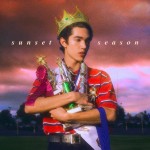Conan Gray embraced his self-proclaimed title of “lonely kid” through music.
Gaining popularity from his YouTube channel, Gray uploads covers, original songs and vlogs detailing his life experiences. Having just concluded his tour as the opening act for Panic! At The Disco, the alumnus and “Crush Culture” singer said he creates music in hopes that others will find parts that relate to themselves. Gray will perform at the El Rey Theatre on Thursday and Friday in promotion of his EP “Sunset Season.”
The Daily Bruin’s Kaia Sherry spoke with Gray about his transition from high school loneliness and writing songs on the toilet to touring with Brendon Urie.
[RELATED: Concert review: Panic! at the Disco melds theatrics with sentiment in indelible live show]
Daily Bruin: How would you describe the journey from YouTube covers to being signed to Republic Records?
Conan Gray: It definitely was a long one. I started songwriting when I was 12 and the first video I ever put up of me singing was me singing a song that I’d written. I think making videos for me was an outlet where I could put songs that I’d written or videos of me and my friends up online. The fact that it turned into a career was a surprise to me, really. … It was a weekend project and I was a pretty normal high schooler.
By the time I was a senior in high school, I had written a song called “Idle Town” and I produced it myself in my bedroom. I recorded it on a really cheap microphone that I taped onto a broken lamp. That song ended up taking off and getting the attention of Republic, and now I’m signed, which is pretty insane because I really didn’t expect it. It just fell in my lap and it’s everything I ever wanted to do with my life.
DB: What benefits does YouTube as a platform give you?
CG: I think YouTube is really versatile because it’s just so massive. When I first started out, … people weren’t making YouTube videos for money, but these days it’s just become such a massive outlet for companies and things like that. I think YouTube for me was just this strange place where I could put up a song that I’d written and people would tell me what they thought about it. It really was very helpful to me as I was a very lonely kid. It was just me and I was putting up this music and telling the world how I felt through these songs and having them tell me that I was a reasonable human for feeling all these emotions.
DB: Do you have any specific songwriting rituals that help spark ideas?
CG: I definitely don’t have any rituals, because it happens differently every single time. I wrote “Idle Town” in the shower, and I came up with the idea for “Crush Culture” on the toilet, so it just kind of happens out of nowhere. I’ll just be walking around or doing something like washing dishes, and a song idea will pop into my head.
DB: Are there specific experiences you drew from when writing “Crush Culture?”
CG: I definitely wrote “Crush Culture” about a very specific experience that happened to me my senior year of high school. … I think senior year was the year when everybody was falling in love. I’d walk in the halls, and everyone was making out with someone, and couples would be holding hands. In high school, I never dated anyone – I still have never dated anyone before. (For people) to be so in love and so open about their love for each other was what inspired “Crush Culture.”
DB: You’ve discussed being half white, half Asian in tweets and YouTube videos. Does your racial identity ever figure into your music?
CG: I think that the biggest thing for me with being biracial was I never really felt like I belonged to any group. I went to a really big public high school in the middle of Texas, so basically everyone was white and I was just that one Asian kid that nobody really understood, and I definitely didn’t belong. I think being biracial automatically puts you in a spot where you don’t really know where you belong in the world. I think that experience really made me become who I am.
I was a really lonely kid and I still am very much a shy person. I spent all of my years watching the world from afar and not really feeling like I was in it because of the fact that I was a bit of a social outcast. With songwriting, I think it’s the most visceral way to express how you’re feeling.
[RELATED: Alumna singer draws inspiration from diversity, seeks to uplift Asian voices]
DB: How was your experience opening for Panic! At The Disco? Did it inspire any future endeavors?
CG: It was absolutely life changing and truly bizarre just because it went really quickly from playing shows of 200 people to shows of 20,000 almost immediately. It was a hard transition, but it was super eye-opening and an honor to go out there and sing to all these people. The crowds were so great and they all put up their phone lights for “Lookalike,” and it really was a pleasure. Getting to see and learn from (Urie) was a massive opportunity and I don’t think I’ll ever be the same after that.
